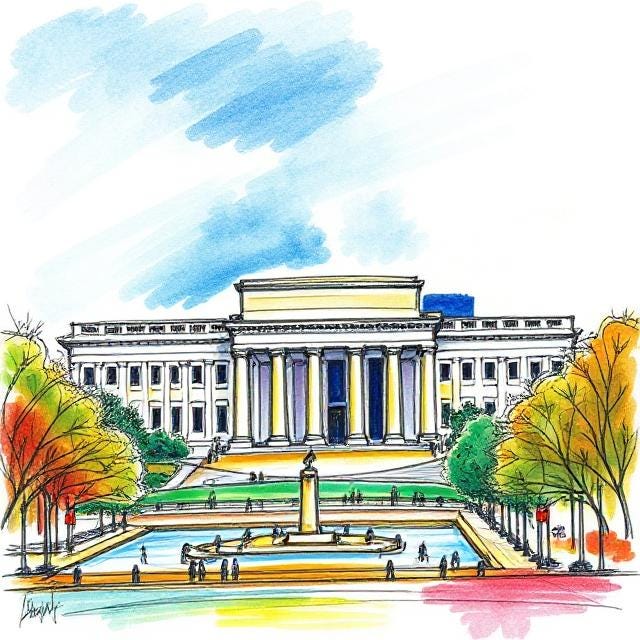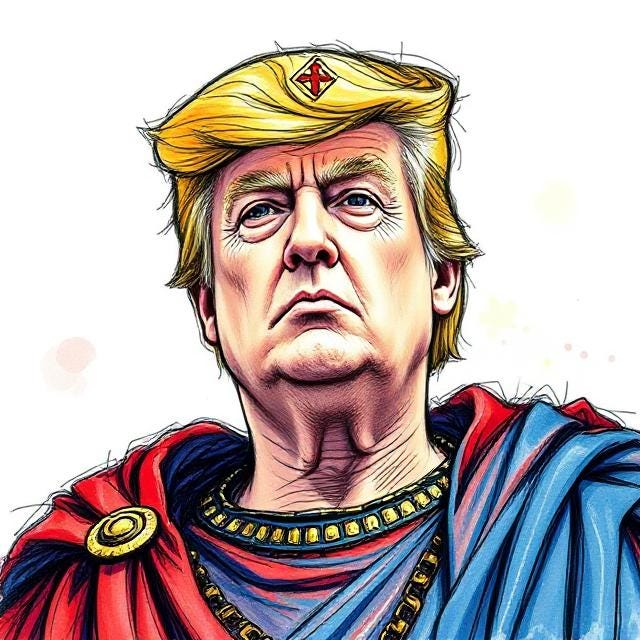Rome didn't die in a day
Can the American Empire survive?
In living memory, we have seen the dismantling of the British Empire and the Soviet Union. We’ve got extensive historical records of the Roman, Ottoman, Mongol, Persian Empires (to name just a few).
We know what the decline of an empire looks like.
The American Empire has placed the United States at the center of the Universe, the President as its emperor, and the liberal democracy as its religion. It’s a new sort of empire: unlike empires of old, it does not consolidate power through conquest, but instead through influence and imperialism.
And just like the Roman Empire, the American Empire is falling. And it seems to be happening in the exact same pattern.
I: The American project, dreams of Empire
Cincinnatus was given complete control over the Roman state to help ensure victory in a particularly tricky battle. In 16 days, he led the Romans to victory and then immediately gave up his absolute power.
George Washington was directly inspired by Cincinnatus when he stood down after two terms as President, setting a permanent precedent. In his farewell address, he spoke of the importance of republican virtue and the dangers of permanent power.
This is one of many examples of the founding fathers being inspired by the Roman Empire and empires of old, in drafting and defending the Constitution and building early America. Adams idolised Cicero’s defence of the republic; Madison obsessed over how to design a system resilient to tyranny; Hamilton kept giving examples of former empires in his essays defending the Constitution. They believed America could capture Rome’s glory without repeating its collapse.
Washington DC is itself one big monument to the Roman Empire. Its buildings are named after the Latin Roman Empire constructs (like the Senate) and modelled after the white marble of those historical sites (though historians now suspect that Romans actually painted their statues and buildings with bright colours: a rare example of a literal historical whitewashing).
America was always destined to be a global superpower. Today, it stands at centre stage: not through conflict and invasion, but through influence.
II: The end of the empires of dominance, and the start of the empire of influence
Rarely has an American leader encapsulated their position as emperor quite as much as Trump. Dignitaries and business executives make pilgrimages to the white house to kiss the ring of Emperor Trump, and in return he bestows lavish gifts and feasts.
When they annoy or wrong him, he stops short of execution - instead preferring public humiliation in front of the media scrum.
But Trump is far from the first emperor of the free world. American presidents have consistently positioned the US at the centre of the globe. Whether it’s through their advocacy and shaping of global systems alliances, like the WTO and NATO, or through their role as the global cop, attacking their enemies (and their allies’ enemies) wherever they are on the planet.
This is the new empire: the Empire of Influence. It would be inconsequential to call it “soft power”, because it’s often pretty tough: instilling governments and leaders that act in their favour, propping up capitalism at any cost.
Britain attempted to transform its Empire of Dominance into an Empire of Influence via the Commonwealth: an attempt to preserve the legacy and links of the British Empire and retain its influence - but it has had a limited impact.
America, until now, has succeeded in building an Empire of Influence.
III: The fall of the Roman Empire and the horsemen of the apocalypse
The Roman Empire did not fall quickly. For many of the Romans living across its vast empire, it may not have even felt in decline. Yet, with hindsight, the decline was obvious, caused by a combination of factors.
1. Plague: the Antonine and Cyprian plagues killed millions, shrinking the army and tax base and accelerating urban decline.
2. Wrong men: corrupt or incompetent emperors led to civil wars and power struggles that drained resources and stability.
3. Shrinking birth rate: Romans were abandoning their baby girls, reluctant or unable to pay a dowry when her time for marriage came. Men dramatically outnumbered women, shrinking the birth rate.
4. Changing climate: there was a surge in drought and extreme weather events in the latter years of the Roman Empire, causing crop failures.
5. Inflation: emperors debased the currency in response to economic challenges, causing trust in the economy to fall and the value of money to plummet.
6. Wealth hoarding: a small number of elites held masses of wealth, depriving the state of tax revenue and hollowing out the middle class.
7. Religious recalibration: Christianity reshaped loyalty and civic life, sidelining traditional institutions that once unified society and politics.
8. Competition: the Germanic confederations gained strength as Rome weakened, ultimately breaking its borders.
The Book of Revelation warns of the four horsemen that will bring about the apocalypse: Conquest, War, Famine, and Death.
Each signals the coming end of the world, and makes life increasingly miserable for its inhabitants before the whole thing kicks the bucket.
These eight factors are much like the horsemen of an empire’s apocalypse. The Aztec empire collapsed following a smallpox epidemic, competition from the Spanish and overtaxation. The Ming dynasty collapsed following a changing climate that caused draught and famine - and revolt from the peasant classes.
It may look like a familiar list: because the Western world is going through much of it today.
1. Plague: The entire world has faced the fifth deadliest pandemic of all time, causing not only widespread death and illness but - perhaps even more widespread - cultural consequences. Declining trust in institutions, more children than ever skipping school and an explosion in loneliness and psychosomatic illness.
2. Wrong leaders: Political systems across the globe are increasingly putting the wrong people in charge. Democracy is showing its vulnerability to populists in the age of social media. Even the supposedly infallible British Parliamentary Democracy allowed a lunatic like Liz Truss into Downing Street with no public mandate, from where she was able to kamikaze into the economy.
3. Shrinking birth rate: The US is experiencing a record-low birth rate, which is expected to soon turn into an unprecedented population decline. Immigration now drives a significant proportion of population growth in the West compared to births.
4. Changing climate: Whether it is man-made or not (it is), it’s impossible to deny that the global climate is changing. As a huge nation, the US feels the brunt of heatwaves, hurricanes and blizzards: while the rising sea level envelops its coasts. Other Western nations that have historically benefitted from fairly neutral weather and rare extreme weather events will find themselves unprepared for what’s to come.
5. Inflation: The entire global economy is built on the assumption that continuous inflation is, not just good, but essential. Maybe that’s true: but the last few years have also proved that inflation can be dangerous. After all, under the current system it is irreversible: so once products hit ridiculous prices, they can never reset to their historical level. Leaders can only slow the rise.
6. Wealth hoarding: Of course there is a big gap between the very richest and the very poorest in society, but a consequence of a rapidly aging population is also that there is a greater amount of wealth hoarding. Intergenerational wealth transfer is delayed and capital is locked up (appreciating assets like houses aren’t being sold and so aren’t stimulating the economy).
7. Religious recalibration: In the early 90s, 90% of Americans were Christian. Today, it is more like 63%. That’s driven mostly by people who now say they have no religion (and I expect many people are still answering those survey questions ‘Christian’ when in reality it has almost no impact on their life).
8. Competition: China has almost certainly overtaken America in its military capabilities, and its economy is on track to overtake the West in a matter of years (incidentally - driven by investment in green energy production).
IV: Xi’s World
So what are the alternatives to the American Empire? The Russians would like to imagine that they could pose a threat, but their invasion of Ukraine has inadvertently proven that this is not the case. They lack military strength: at a cost of more than a million casualties, the Russians have gained less than one percent of Ukrainian territory. They are little more than global mischief makers now.
As you drive through Male, the capital city of the Maldives, you come across billboard after billboard, adorned with mock ups of new arenas, complexes, and infrastructure that is coming soon.
All of it: paid for by Beijing.
This is the modus operandi of modern day China: through global investments (but often loans), they spread their influence throughout the globe. The country spends more than $10 billion a year opening “Confucius Institutes” around the world, teaching Mandarin and Chinese culture. There was one at my university that took up a whole building.
But China is fundamentally misaligned with the values that, most of us in the West believe, are core to happy and prosperous lives. The CCP arrests academics, journalists and protestors. It scrubs maps and history books of facts to create its own realities. Freedom, privacy and comfort are just not important under their system.
Not to mention their ruthlessness when it comes to minority groups. Over a million Uyghurs - an ethnic group from Northeast China - are being held in concentration camps by the CCP. It is hard not to call this a genocide.
China is winning: on soft power, on hard power, on military strength, on economic growth. But they are dangerous, and this can’t be allowed to happen.
V: Changing course: how the West can still win
Make friends
Countries like India will be the kingmakers as empires rise and fall. I think one of the biggest strategic missteps the West is making right now is not dedicating more resources to cosying up to India. It’s one of the world’s fastest growing economies, largely aligned to Western values, English speaking, huge tech and manufacturing centres and strategically useful location.
Instead, far from befriending, the US is alienating: making visas harder to access for Indians, slapping huge tariffs on exports. The obvious effect of this is that India’s leadership will start to slide towards Xi and Vlad. There are many reasons why India doesn’t want to side with China, but they will if China offers them more security and better prospects. The west needs to step up.
Influence people
The West seems to have forgotten about the importance of soft power. Most of the films we watch were made in Hollywood, English is the lingua franca of the globe, students from every country flock to the Ivy League.
But this is not guaranteed. South Korea has shown that non-English, non-Hollywood films and TV shows can go global and increase their global influence: China will be watching that success.
The West must retain its soft power crown by continuing to invest in these sorts of initiatives. A crucial one is aid: by dismantling USAID Trump has harmed America’s reputation, alienated its allies and left a huge gap ready to be filled by China.
But many steps back have brought one step forward: his role as peacemaker around the world is a good example of retaining American soft power and influence.
Reshaping power
The US Constitution imagined a complex balancing act of distributed power. British Parliamentary Democracy evolved to deliver the same outcome: distributed, democratic power.
In both countries, power has centralised into two places: the leader and the bureaucrats. I think historians will wonder how this slip happened without many people noticing.
Prime Minister started as a nickname for the Cabinet member that seemed to command the majority. It was actually meant pejoratively: implying that the individual had risen above their ranks. There was never any intention or any device for the PM to hold additional power. But now, the Prime Minister is close to a President. The Ministers are now essentially powerless, just media spokespeople for the government (this is why it’s easy to appoint a SoS for Education who has no experience of working in education). Outside of the Prime Minister, decisions are taken and executed by a team of civil servants who are motivated to maintain the status quo.
This system needs a shake-up. Ministers need to regain control over their departments and the Prime Minister needs their power clipped to return to Parliamentary democracy and a true cabinet-led executive.
VI: They think it’s all over
There is not really an American Empire in a territorial sense. I’ve been using that phrase to describe the dominance of the Liberal Democracy and the Western world on the planet today.
But that dominance is not guaranteed. The values that are important to us (freedom, ambition, comfort) are not guaranteed and not shared by every would-be dominant force in the world.
The Romans did not wake up one morning and find their empire was over. It happened slowly, over decades and caused by myriad factors. Every empire since has fallen, and there’s a certain inevitability that the same will happen to the dominance of the liberal democracy and the west: the American Empire.
Those of us that believe the ideals and values are worth fighting for should feel a moral imperative to ensure that doesn’t happen.






